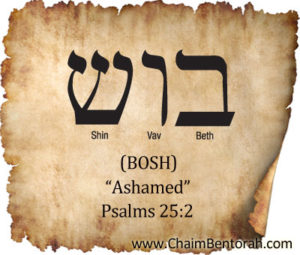HEBREW WORD STUDY – ASHAMED – BOSH בוש Beth Vav Shin
Psalms 25:2 “O my God, I trust in thee: let me not be ashamed, let not mine enemies triumph over me.”
 When I see the word ashamed I think of being embarrassed, or you make a big mistake that hurt someone and you are ashamed of yourself. Webster defines shame as distress or embarrassment by feelings of guilt, foolishness or disgrace. David is obviously concerned about his enemies triumphing over him. Somehow the English definition of shame, feeling guilty, foolish or embarrassed does not seem to fit. Sure he would feel all this his enemies were but I suspect some greater emotion.
When I see the word ashamed I think of being embarrassed, or you make a big mistake that hurt someone and you are ashamed of yourself. Webster defines shame as distress or embarrassment by feelings of guilt, foolishness or disgrace. David is obviously concerned about his enemies triumphing over him. Somehow the English definition of shame, feeling guilty, foolish or embarrassed does not seem to fit. Sure he would feel all this his enemies were but I suspect some greater emotion.
Every translation I have read renders the word bosh as ashamed. That is fine so long as we expand our definition of bosh to something worse than mere guilt, foolishness, or embarrassment. In searching through the origins of this word I discovered it has the idea of the feelings one has when their private parts are exposed. This takes in more than our standard definition of shame. It will then include humiliation, loss of dignity and pride. I think this is what David is really afraid of.
Rabbi Samson Hirsch the 19th Century linguist and Hebrew master also includes the idea of disappointment and disillusionment. No,w this is making more sense. David is asking God to deliver him from his enemies and not to disappoint him or cause him to be disillusioned if they do succeed. He declares this because He is telling God that he is trusting in Him. In modern term,s it would be like saying: “Hey, I trusting you to not let my enemies triumph over me, so don’t let me down, don’t let me become disillusioned in You. I don’t know, I am not comfortable with that. Let’s look further.
As I ponder the grammatical structure of this verse, I fond the syntax to be ambiguous (as it usually is in Hebrew). There are a couple of ways to render this. When I look at the word trust I find it is the word batach. The word itself means to be welded to God.. Archaeologist have found evidence of a primitive form of welding that is over 3,000 years old. When you weld two pieces of metal together you are melting those pieces into each other. A perfect weld will be so strong that the piece of metal will break anywhere else before it breaks at the weld. The weld will be the strongest spot.
But say, if David has this perfect confidence why is he asking God to not let him be ashamed. Therein lies a little grammatical rule that my online Hebrew class who subscribe to our All Access site will learn in the next this week. This word bosh for ashamed is in a Qal imperfect form with a paragogic Hei at he end. The paragogic is an intensifier so we should rendered this as: “I am trusting in you so I will most certainly not be disappointed.” So why do translators render this as a “Let me not be ashamed?” Because grammatically the Jussive (request or permission) and the Qal imperfect with a paragogic Hei are spelled out identically, same consonants and vowels. So how do we know if this should be translated as: “Let me not be ashamed” or “I will most certainly not be ashamed?” Well, the context and tradition. Tradition goes with the Jussive. Considering the origin of the word batch trust, however, as being welded to God, I would go with just the Qal Imperfect with the paragogic Hei.
What do you think?







I agree with you.
I think verse 1 has the answer. David really trusted his Lord. Often because our knowledge of the Lord is not as accurate we fail to understand that David really did expect God to uphold him.